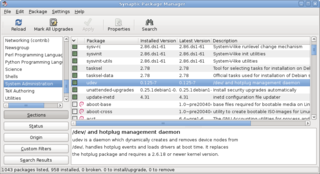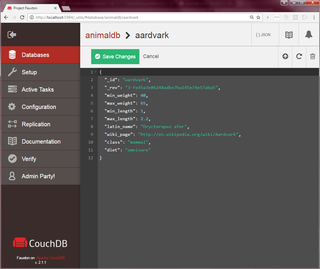
A package manager or package-management system is a collection of software tools that automates the process of installing, upgrading, configuring, and removing computer programs for a computer in a consistent manner.
Web development is the work involved in developing a website for the Internet or an intranet. Web development can range from developing a simple single static page of plain text to complex web applications, electronic businesses, and social network services. A more comprehensive list of tasks to which Web development commonly refers, may include Web engineering, Web design, Web content development, client liaison, client-side/server-side scripting, Web server and network security configuration, and e-commerce development.
A collaborative real-time editor is a type of collaborative software or web application which enables real-time collaborative editing, simultaneous editing, or live editing of the same digital document, computer file or cloud-stored data – such as an online spreadsheet, word processing document, database or presentation – at the same time by different users on different computers or mobile devices, with automatic and nearly instantaneous merging of their edits.
In computing, a solution stack or software stack is a set of software subsystems or components needed to create a complete platform such that no additional software is needed to support applications. Applications are said to "run on" or "run on top of" the resulting platform.

Mnesia is a distributed, soft real-time database management system written in the Erlang programming language. It is distributed as part of the Open Telecom Platform.

Apache CouchDB is an open-source document-oriented NoSQL database, implemented in Erlang.

Google App Engine is a cloud computing platform used as a service for developing and hosting web applications. Applications are sandboxed and run across multiple Google-managed servers. GAE supports automatic scaling for web applications, allocating more resources to the web application as the amount of requests increases. It was released as a preview in April 2008 and launched officially in September 2011.

WaveMaker is a Java-based low-code development platform designed for building software applications and platforms. The company, WaveMaker Inc., is based in Mountain View, California. The platform is intended to assist enterprises in speeding up their application development and IT modernization initiatives through low-code capabilities. Additionally, for independent software vendors (ISVs), WaveMaker serves as a customizable low-code component that integrates into their products.
Web2py is an open-source web application framework written in the Python programming language. Web2py allows web developers to program dynamic web content using Python. Web2py is designed to help reduce tedious web development tasks, such as developing web forms from scratch, although a web developer may build a form from scratch if required.

Google Wave, later known as Apache Wave, was a software framework for real-time collaborative online editing. Originally developed by Google and announced on May 28, 2009, it was renamed to Apache Wave when the project was adopted by the Apache Software Foundation as an incubator project in 2010.

Couchbase Server, originally known as Membase, is a source-available, distributed multi-model NoSQL document-oriented database software package optimized for interactive applications. These applications may serve many concurrent users by creating, storing, retrieving, aggregating, manipulating and presenting data. In support of these kinds of application needs, Couchbase Server is designed to provide easy-to-scale key-value, or JSON document access, with low latency and high sustainability throughput. It is designed to be clustered from a single machine to very large-scale deployments spanning many machines.

Opa is a programming language for developing scalable web applications. It is free and open-source software released under a GNU Affero General Public License (AGPLv3), and an MIT License.
Backend as a service (BaaS), sometimes also referred to as mobile backend as a service (MBaaS), is a service for providing web app and mobile app developers with a way to easily build a backend to their frontend applications. Features available include user management, push notifications, and integration with social networking services. These services are provided via the use of custom software development kits (SDKs) and application programming interfaces (APIs). BaaS is a relatively recent development in cloud computing, with most BaaS startups dating from 2011 or later. Some of the most popular service providers are AWS Amplify and Firebase.
Meteor, or MeteorJS, is a partly proprietary, mostly free and open-source isomorphic JavaScript web framework written using Node.js. Meteor allows for rapid prototyping and produces cross-platform code. The server-side MongoDB program is the only proprietary component of Meteor and is part of the Meteor download bundle. It is possible to use Meteor without using the server-side MongoDB. It uses the Distributed Data Protocol and a publish–subscribe pattern to automatically propagate data changes to clients without requiring the developer to write any synchronization code. On the client, Meteor can be used with any popular front-end JS framework, Vue, React, Svelte, Angular, or Bazel.
Kotlin is a cross-platform, statically typed, general-purpose high-level programming language with type inference. Kotlin is designed to interoperate fully with Java, and the JVM version of Kotlin's standard library depends on the Java Class Library, but type inference allows its syntax to be more concise. Kotlin mainly targets the JVM, but also compiles to JavaScript or native code via LLVM. Language development costs are borne by JetBrains, while the Kotlin Foundation protects the Kotlin trademark.
Elliptics is a distributed key–value data storage with open source code. By default it is a classic distributed hash table (DHT) with multiple replicas put in different groups. Elliptics was created to meet requirements of multi-datacenter and physically distributed storage locations when storing huge amount of medium and large files.

The Windows Library for JavaScript is an open-source JavaScript library developed by Microsoft. It has been designed with the primary goal of easing development of Windows Store apps for Windows 8 and Windows 10, as well as Windows Phone apps for Windows Phone 8.1, Windows 10 Mobile and Xbox One applications using HTML5 and JavaScript, as an alternative to using WinRT XAML and C#, VB.NET or C++ (CX).
Firebase was a company that developed backend software. It was founded in San Francisco in 2011 and was incorporated in Delaware.









